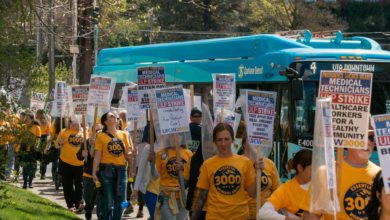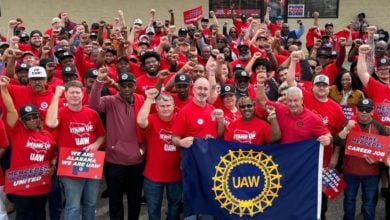Photo: UPS workers at a July 2023 practice picket in New York City. Credit: Wyatt Souers
There is a disconnect between “economic indicators” and how the economy is actually affecting workers. In a system based on labor exploitation, a “good” economy does not automatically mean better conditions for workers in either an absolute or relative sense. Major economic statistics measure stability, not quality of life. This creates a disconnect between how the economy is perceived, rooted in class interests.
The mainstream political debate asks questions that can only be answered in a relative sense. The question “Is the economy good?” can only be answered by asking: For whom? Relative to what? And with what goal in mind? For communists, the answers are: for the working class, relative to the wealth they produce and with the goal of maximizing their control over that production. In that regard, the state of the economy is certainly not good.
According to estimates from the Census Bureau in March 2024, 21% of the labor force – over 35.6 million people – found it “very difficult” to make ends meet week-to-week. Nearly 144 million people, 85% of all workers, were having at least “a little” difficulty covering their expenses week-to-week. At least 22.7 million people sometimes don’t have enough to eat every week, and 53 million felt depressed “at least several days” in the past two weeks. Sixty five percent of those making $50,000-$100,000 report living paycheck-to-paycheck. And this is the case for 75% of those making less than $50,000.
A family in the United States earns on average roughly $71,000 per year, but a recent Gallup poll found that a family needs at least $85,000 annually to get by. In a recent poll, only 15% of those making under $50,000 said they felt the economy was “getting better,” and just 12% of those said their personal finances were “better off” than they were a year ago. Twenty five percent and 16% of those making between $50,000-$100,000 said the same, respectively. In terms of both reality and perception, then, a clear majority of workers feel that the economy is, at best, not improving – with significant percentages reporting that it is getting worse.
The challenges facing the working class require that we articulate a different paradigm to shift the balance of power in the economy in order to address the actual interests of the working class, not the profit motives of the ruling class, around which the entire economic discussion revolves at present.
Downward trends
Relentless focus on profit is core to capitalism. This obsession with profit is the system’s motor engine. Over the past several decades, however, profitability has been in secular decline.

Credit: Michael Roberts Blog

Credit: Michael Roberts Blog
This trend reduces the desire to invest, as each dollar invested doesn’t go as far as it used to. Currently, “annual global investment is now less than that needed to replace worn out fixed assets.”

Credit: Michael Roberts Blog
Capitalists have sought to address this through policies known as “neoliberalism.” Specifically: expanding production in the developing world (globalization); attacks on public spending and progressive taxation (austerity); and a massive expansion of U.S. military power to subdue those who refuse to comply with the imperial agenda. None of this has arrested the downward trends, increasingly the need for transition in economic approaches collides with elite self-interest. Specifically, profitability can only be increased by the exact policies that have left workers unsatisfied with the economic status quo.
Socialism is the future, build it now!
There are a certain amount of resources, both human and material, on Earth. There are also a certain amount of needs and “wants.” Under socialism, the mobilization of resources serves to secure the basic needs of society first and foremost: food, clothing, shelter, healthcare, education and access to information. Socialism assures no one has to fear being destitute, left hungry on the street.
The various lines of industry would, in the first instance, be centered on these foundational tasks. These things can’t just happen randomly, and many are interconnected. To meet these basic needs there needs to be research into how to mobilize the required resources and also adjudicate any potential conflicts. Further, there has to be a process to manage beyond the basics of what we need to mobilize resources for the things we want.
This is socialism, uniting the “commanding heights” of the economy with new political rules and instruments to facilitate the rational use of our human and material resources. A socialist economy will be managed by democratic bodies that can set the broad “national priorities” for resource mobilization and deployment. These will include entities that specifically represent women and nationally oppressed communities. Structures representing workers on the job will integrate their input into the management of enterprises, ensuring workers control of investment, production and distribution.
Society is already partially structured for socialist transformation. The “top 1% of companies by sales account for 80% of revenues.” Forty eight percent of all employees in the United States work at firms of over 100 employees, with just over one-fifth working in firms with more than 500 employees. Take, for example, the 100 largest US companies:
WalMart, Amazon, Costco, Kroger, Home Depot, Target, Lowes, Albertsons, Best Buy, TJX, Publix, GE, Boeing, Dupont, Johnson & Johnson, Proctor and Gamble, Caterpillar, Lockheed Martin, Honeywell International, Deere, Nike, General Dynamics, 3M, Pepsi, ADM, Tyson, CHS, Coke, Exxon, Chevron, Phillips 66, Valero Energy, Marathon, ETP, World Fuel Services, ConocoPhillips, Enterprise Product Partners, Exelon, Plains GP, General Motors, Ford, Apple, Alphabet, Microsoft, Dell, IBM, Intel, United Technology, Sysco, HP, Meta, Cisco, Oracle, Tech Data, Berkshire Hathaway, UnitedHealth, Anthem, Humana, Cigna, McKesson, AmerisourceBergen, CVS Health, Cardinal Health, Walgreens Boots Alliance, Centene, HCA Healthcare, AT&T, Verizon, Comcast, Charter Communications, JPMorgan, Fannie Mae, Bank of America, Wells Fargo, Citigroup, Freedie Mac, Goldman Sachs, Morgan Stanley, American Express, TIAA, Capital One, Pfizer, Merck, Abbvie, State Farm, Metlife, Prudential, AIG, New York Life Insurance, Nationwide, Liberty Mutual, Allstate, Mass Mutual, Progressive, UPS, Fedex, Delta, American Airlines, United Continental Holdings, Walt Disney.
If workers controlled just these companies, 0.007% of all businesses excluding the very smallest, they would be in control of the key levers of investment, production and distribution. Practically, the biggest obstacle, then, to a socialist transformation is the relatively small group of capitalists who control the economy.
From here to there
If we want to get from here to there the most important task is for workers to build a political alternative around the need for a radical change in the economy. While many workers are dissatisfied, often majorly, with the status quo, confusion about what to do is still the main factor. Tens of millions of our fellow workers are set to vote for one of the two major parties that clearly have no answer for the problems of workers.
Tens of millions of others will stay at home because they have no hope that the elections can bring change. Even among many who know big change is needed, what to do and to accomplish it remains elusive. It’s crucial to have a way to reorient the conversation in a way that dramatizes the inadequacies of capitalism in a way that speaks directly to how they can be overcome.
This is why the PSL has raised the slogan of “Nationalize the Fortune 100” in our Vote Socialist 2024 election campaign – not because that is analogous to socialism per se, but because it speaks to the u-turn we need in the direction of the economy. We need to show how much is possible with more democratic central planning, and how little can be done as long as “the economy” is just a collection of individual monopolies all focused only on profit.
The fact that such an emergency crash program would likely be legally untenable in the United States, despite being desperately needed, speaks to the fact that capitalism can’t be reformed, at least not enough to make the changes workers need to live with dignity. This reality reaffirms that the biggest obstacle standing in workers’ way is the capitalist state – “the government.” Only by uprooting it by making a revolution can we chart a new course for ourselves and generations to come.






